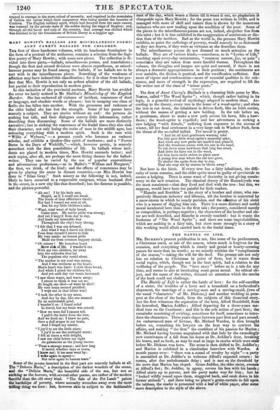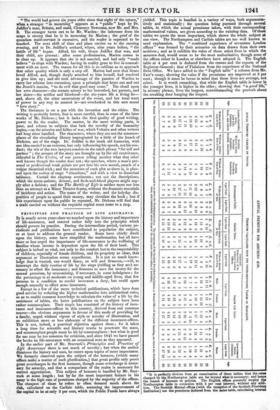THE BATTLE OF LIFE.
Ma. DICKENS'S present publication is not, like some of its predecessors, a Christmas carol, or tale of the season, where much is forgiven for the occasion, and everything which is timely and genial or hearty-seeming passes for more than its worth; as we scantly criticise the "compliments of the season,"—taking the will for the deed. The present tale not only has no relation to Christmas in point of form, but it wants those social topics, which, though not in the best spirit, had a relation to the wellbeing of the people. The "love story" before us is a tale for any time, and seems to aim at inculcating some great moral. Its ethical ob- ject, and the name of the writer, demand an attention which the merits of the book could not challenge.
The Battle of Life is rather the battle of love : for the self-sacrifice of a sister, the troubles of a lover and a household on a bethrothed's elopement, the marriage of a serving-man and a serving-maid, (two of the usual "characters' of Mr. Dickens,) and another wedding in pros- pect at the close of the book, form the subjects of this theatrical story. Act the first witnesses the separation of the hero, Alfred Heathfield, from his betrothed, Marion Jeddler ;Alfred departing for a three-years me- dical tour on the Continent : and this is the sole action of part first; the remainder consisting of writing, sometimes for itself, sometimes to intro- duce the characters. Three years elapse between part first and part second. An embarrassed man of fortune, Mr. Michael Warden, is then brought before us, consulting his lawyers on the best way to retrieve hifi affairs, and making "the firm' the confident of his passion for Marion ; Mr. Michael having become acquainted with that lady by the exceedingly new contrivance of a fall from his horse at Dr. Jeddler's door, breaking his bones, and so forth, as may be read at large in stories which were stale before Mr. Dickens was born. The scene is then shifted to Dr. Jeddler's; and Marion is exhibited in a clandestine interview with Warden. A month passes over: "there was a sound of revelry by night "—a party is assembled at Dr. Jeddler's to welcome Alfred's expected return : he comes, after due melodramatic delay ; and is met on the threshold by the news that Marion has eloped. Grace Jeddler, the elder sister, swoons at Alfred's feet; Dr. Jeddler, in agony, covers his face with his hands ; Alfred starts up to pursue, and the party make way for him ; but he "looked wildly round upon them, staggered back, and sunk down in his former attitude"; and there being no player's green-curtain to fall upon the tableau, the reader is presented with a leaf of white paper, after some more description in the style of the above.
"The world had grown six years older since that night of the return," when a stranger "in mourning" appears at a " public " kept by Dr. Jeddler's man, Britain, and maid, Clemency Newcome, now Mr. and Mrs. B. The stranger turns out to be Mr. Warden : the inference from his crape is strong that he is in mourning for Marion ; the grief of the quondam maid-servant is excessive, and the reader is expected to be touched. The next shift of time and place carries us to the ensuing evening, and to Dr. Jeddler's orchard, where, nine years before, "the battle of life" began. Alfred, his wife, Grace Jeddler that was, and their child, are present: after some preliminaries, Marion comes in to clear up. It appears that she is not married, and had only "made believe" to elope with Warden; having in reality gone to live in conoeal- ment with an aunt. The reason for all this is so sublime as to approach that other quality which is only a step off. Marion had seen that Grace loved Alfred, and, though deeply attached to him herself, had resolved to give him up ; and she took advantage of the passion of Warden to carry her scheme into execution, upon a principle that beats out and out the Jesuit's maxim, "to do evil that good may come." The cloud upon her own character—the certain misery to her betrothed, her parents, and her sister—the artifice and falsehood—the six-years life a living lie— and, above all, the utter uncertainty of the event, and her total want of power in any way to control it—are overlooked in this new moral "love story."
The literature is on a par with the invention and the ethics. The writing is probably better, that is more careful, than in some of the later works of Mr. Dickens ; but it lacks the first quality of good writing, power to fix the reader. The matter, in the mere writing parts, is poor, and relates to subjects that lack the novelty of the humanity topics,—as the miseries and follies of war, which Voltaire and other writers had long since handled. The characters, where they are not the common- places of the circulating library impregnated by a little of the knack of Dickens, are of the stage. Dr. Jeddler is the stock old humorist, with one idea carried to an extreme, but only influencing his speech, not his con- duct; the wit of the two lawyers consists in the catch phrase "for self and partner"; the arrears of the story are brought up by the old contrivance, ridiculed in The Critic, of one person telling another what that other well knows though the reader does not; the speeches, where a man's per- sonal or professional weak points are put into his own mouth, smack of a vulgar theatrical trick ; and the structure of such plot as there is, is plan- ned upon the notion of stage "situations," and with a view to theatrical tableaux. Curtail the claptrap sentiments ; cut out the descriptions, which the scene-painter, dresser, and flesh-and-blood players might sup- ply after a fashion ; and the The Battle of Life is neither more nor less than an attempt at a Minor Theatre drama, without the dramatic essentials of incidents and action. The name of the writer, and the holyday dis- position of people to spend their money, may circulate the book ; but if this experiment upon the public be repeated, Mr. Dickens will find that a trade carried on without the requisite capital must come to a stop.































 Previous page
Previous page